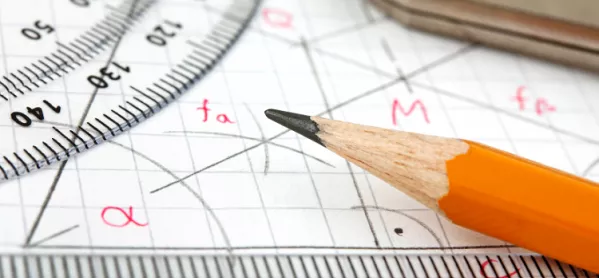What problems did you see after the first group of students sat the new GCSE maths?
Many students still struggle with arithmetic fluency. They may know how to tackle a problem but lose marks through arithmetic slips or misapplied methods.
So, what should teachers be telling students to do?
Going right back to my school days, which were a long time ago, and beyond, teachers have been telling students to show their working clearly.
However, we still see many instances of work with little structure and no indication of what is happening at each step of working.
Well-structured answers with the odd word of explanation not only make the examiners’ task easier, but also make it much easier for the student to see what they are doing and make the right choice for the next step. So, in the next few weeks, teachers need to be really drilling home the old message about showing every stage of your working.
Does this explain why some students are more successful?
More successful students will show their working and will know formal methods for solving problems. But, more importantly, they can spot how to carry out a calculation efficiently, making the right choice from mental methods, formal and informal written approaches or efficient calculator use.
Working with students on how to choose between methods could, therefore, help them to be more successful in an exam situation, when they are working against the clock.
Were there any areas of the specification in particular that last summer’s students had difficulty with?
One area of the new GCSE where the demands are very different, and which is proving to be a real challenge, is the mathematical thinking aspect. This now features more prominently in exams than in previous years and a lot of the questions that proved most challenging were those that asked students to interpret, evaluate and criticise methods or solutions. So, focusing revision sessions on these types of questions would be beneficial.
What else should we be focusing on in revision sessions for students preparing to take exams this summer?
Understanding and working with proportion is at the heart of mathematics at GCSE. Ratio, rates of change and proportional reasoning, often in non-standard questions, all feature strongly in the new GCSE, and the student who can see the links and similarities between topics, and show a deep understanding of multiplicative reasoning, will be successful.
Is there anything that teachers can do to help to prepare future cohorts?
We know that teachers are doing a lot of work on the skills that feature in the new GCSE through key stage 3, and we are confident we will see big improvements over time.
Using common approaches, whether those be bar modelling, ratio tables or using multipliers to solve apparently different problems, will help students make those connections themselves and give them tools to use in the exam.
AQA has also been supporting a national project run by NCETM (National Centre for Excellence in the Teaching of Mathematics) across maths hubs, looking at challenging topics in the new GCSE and how teaching can be developed in those areas.
Andrew Taylor is head of maths at AQA. To find out more about the support and networking available through AQA’s maths hub events, visit the AQA maths hub.
Want to keep up with the latest education news and opinion? Follow Tes on Twitter and like Tes on Facebook


